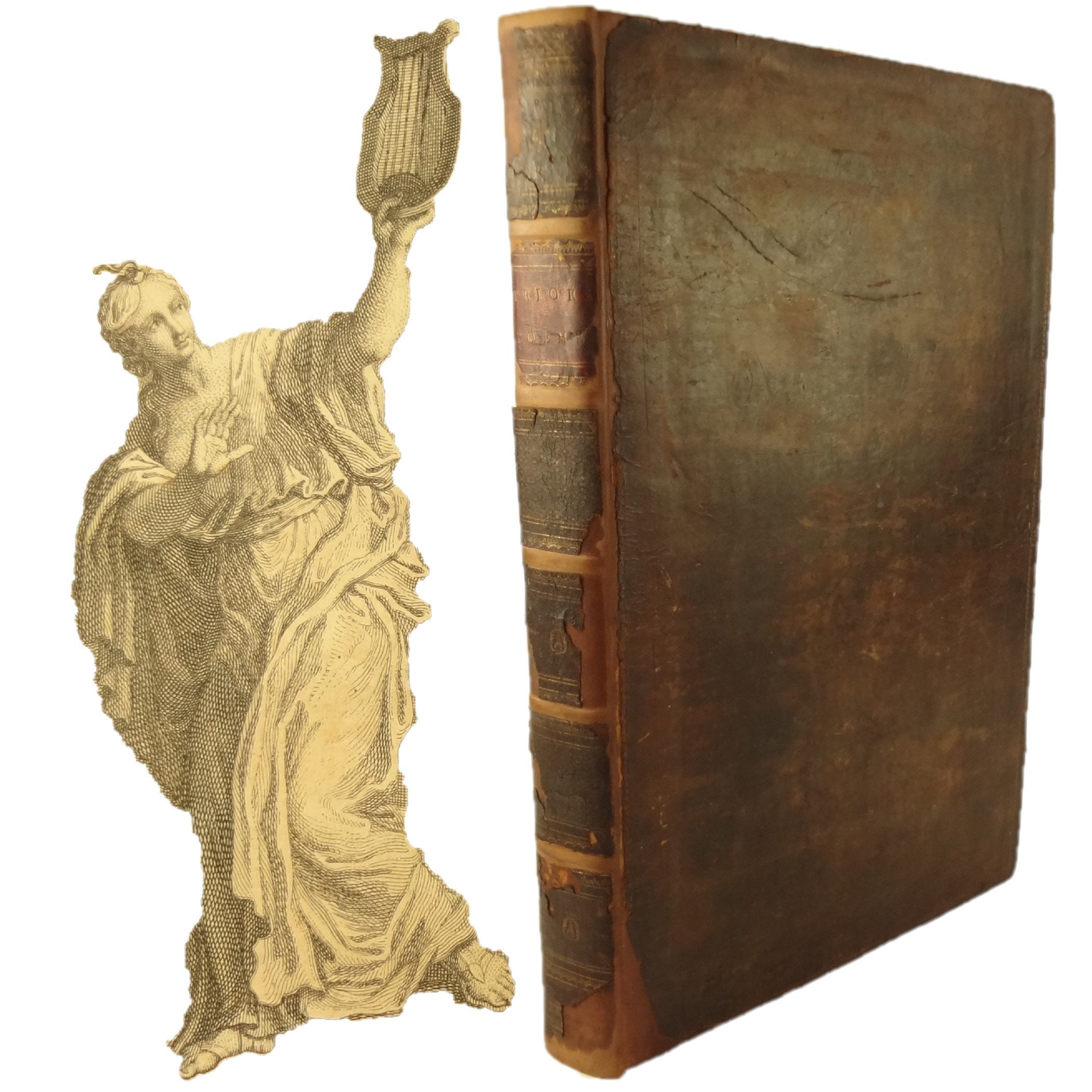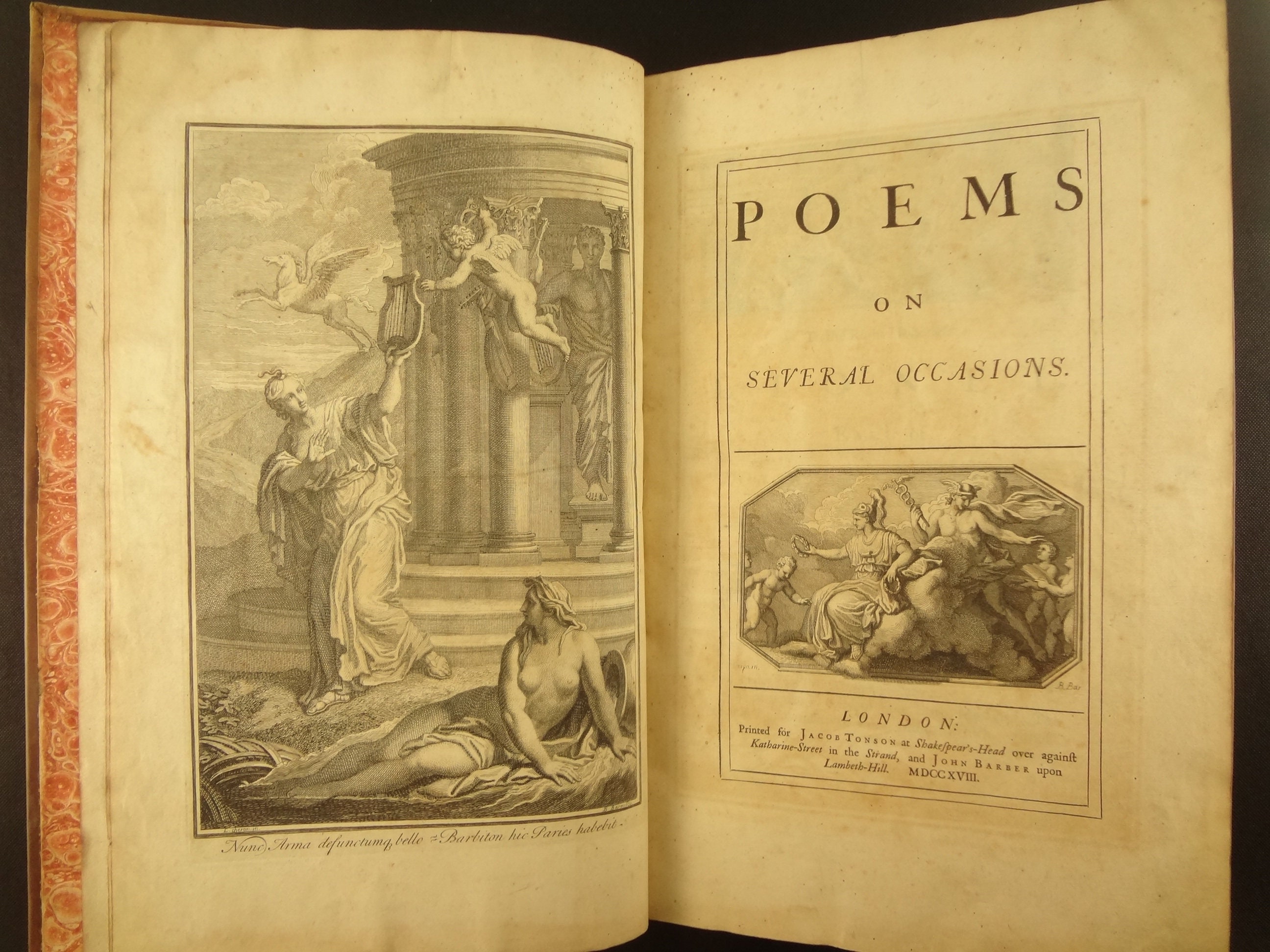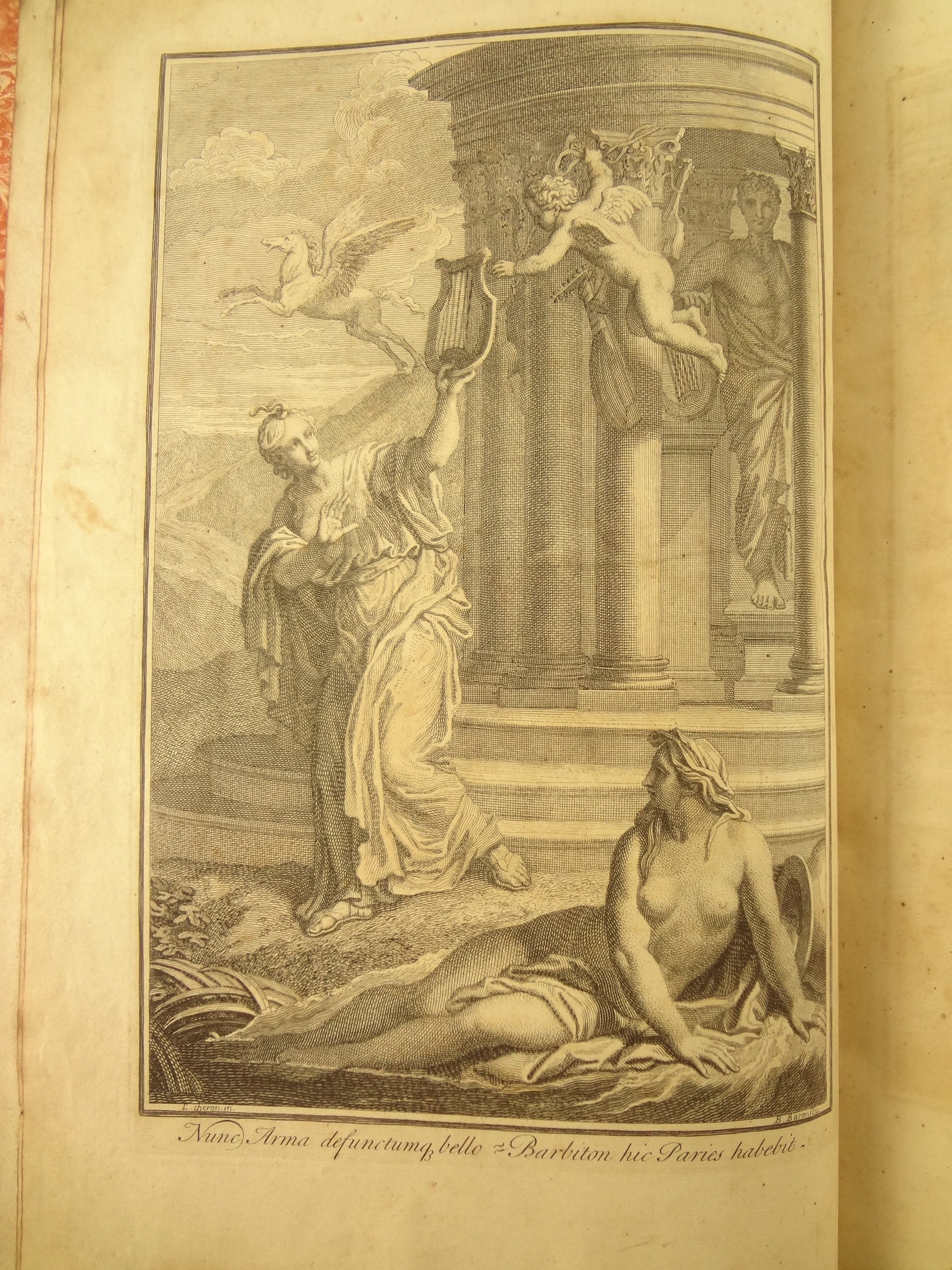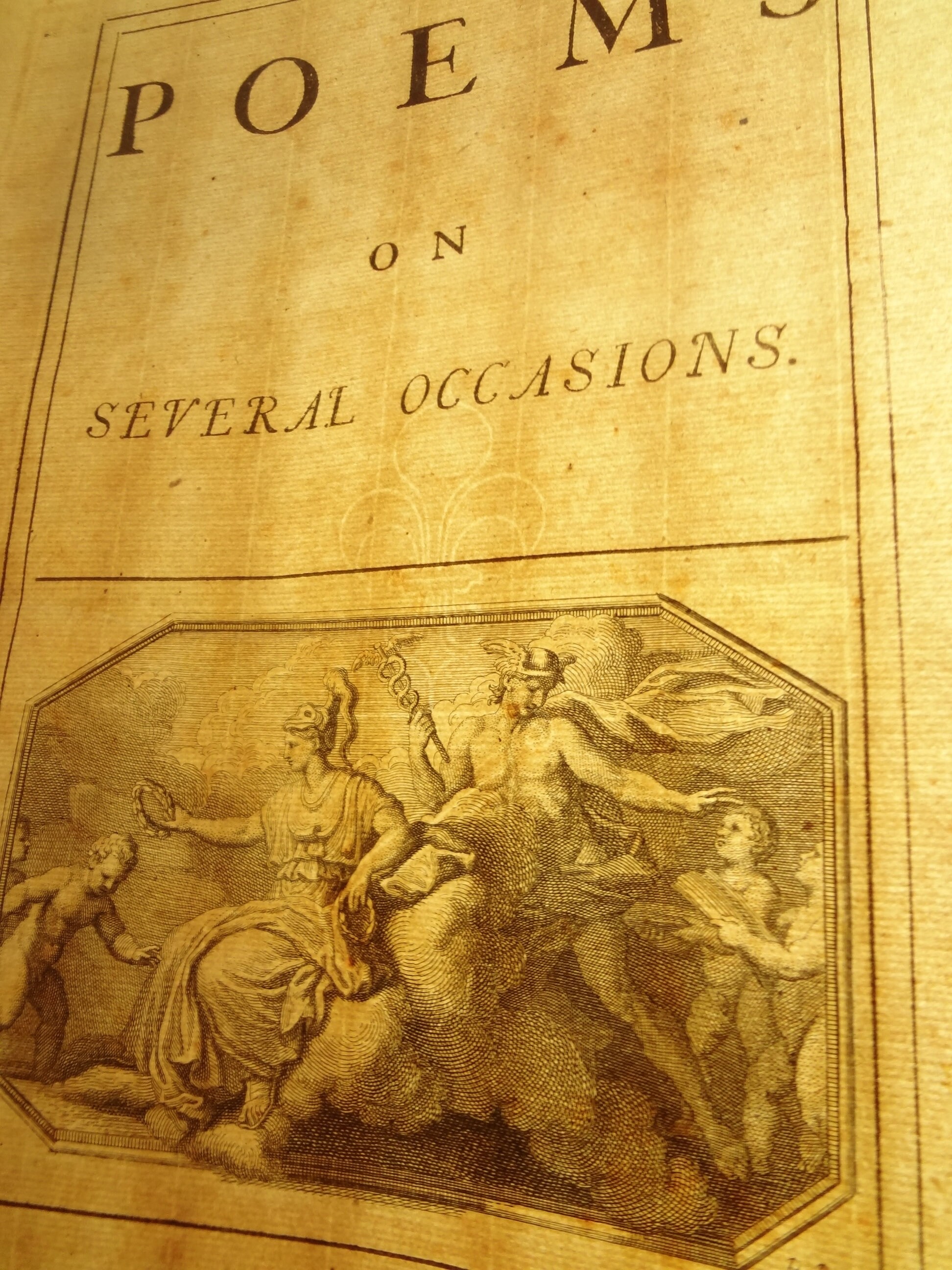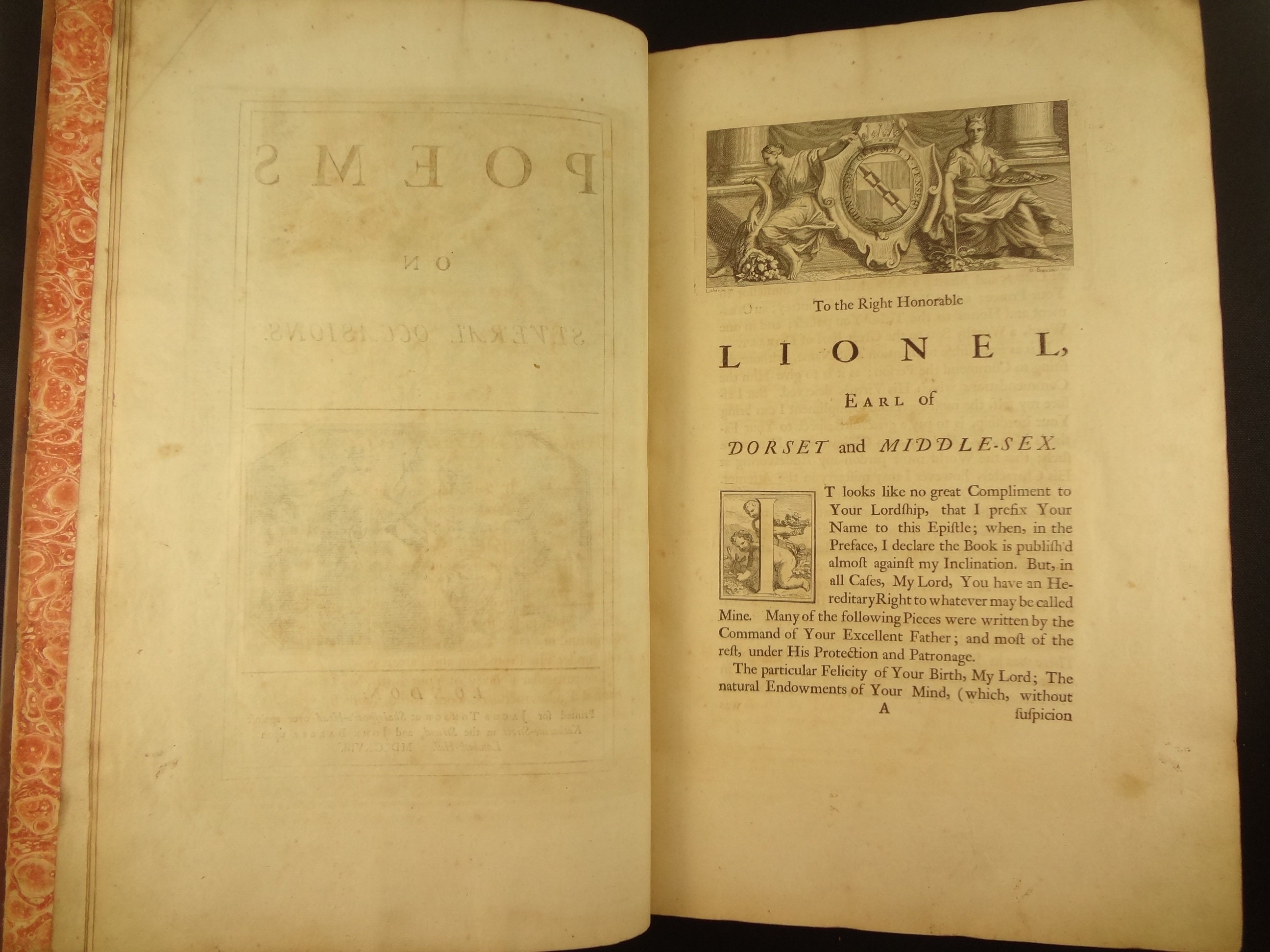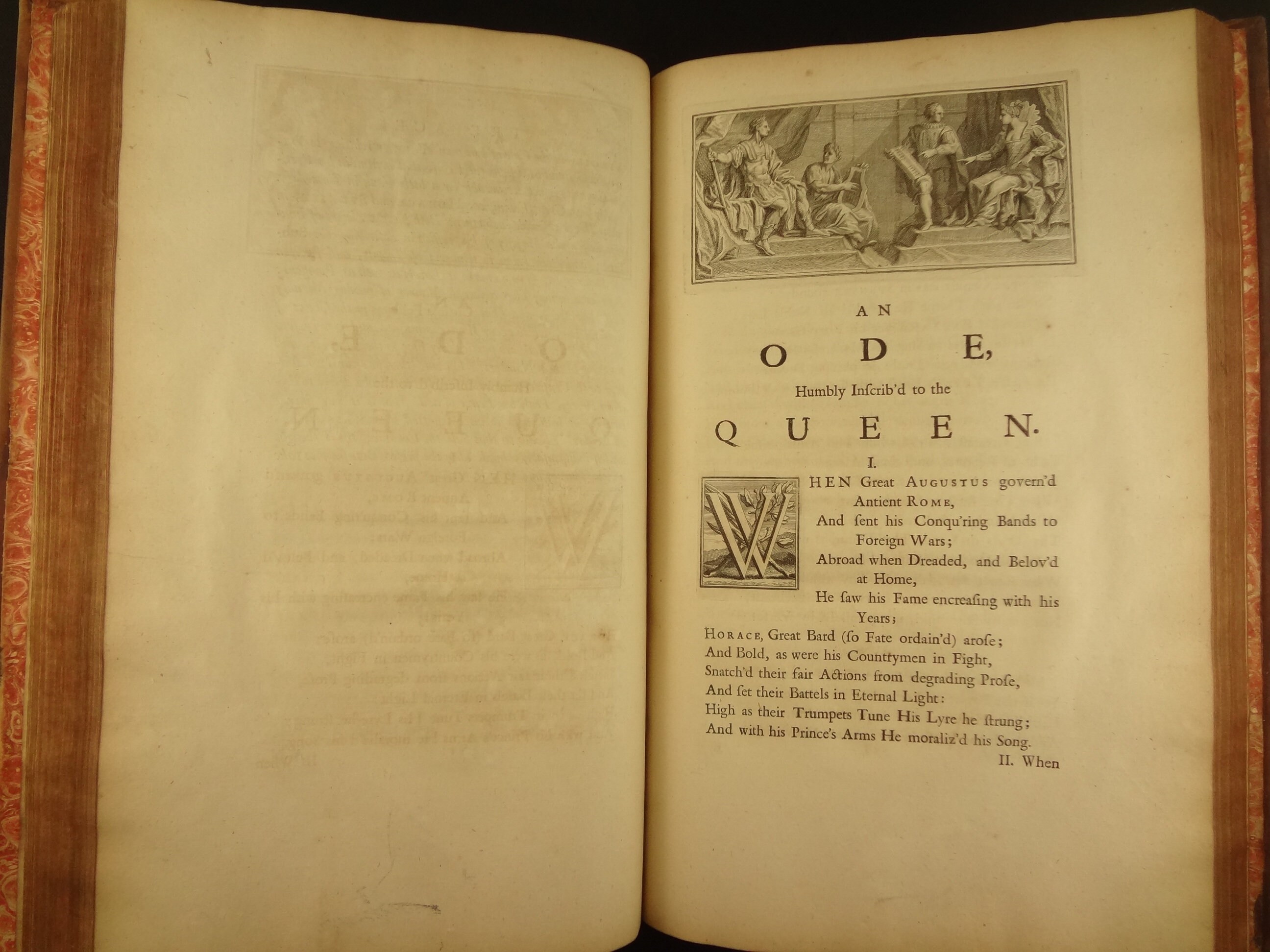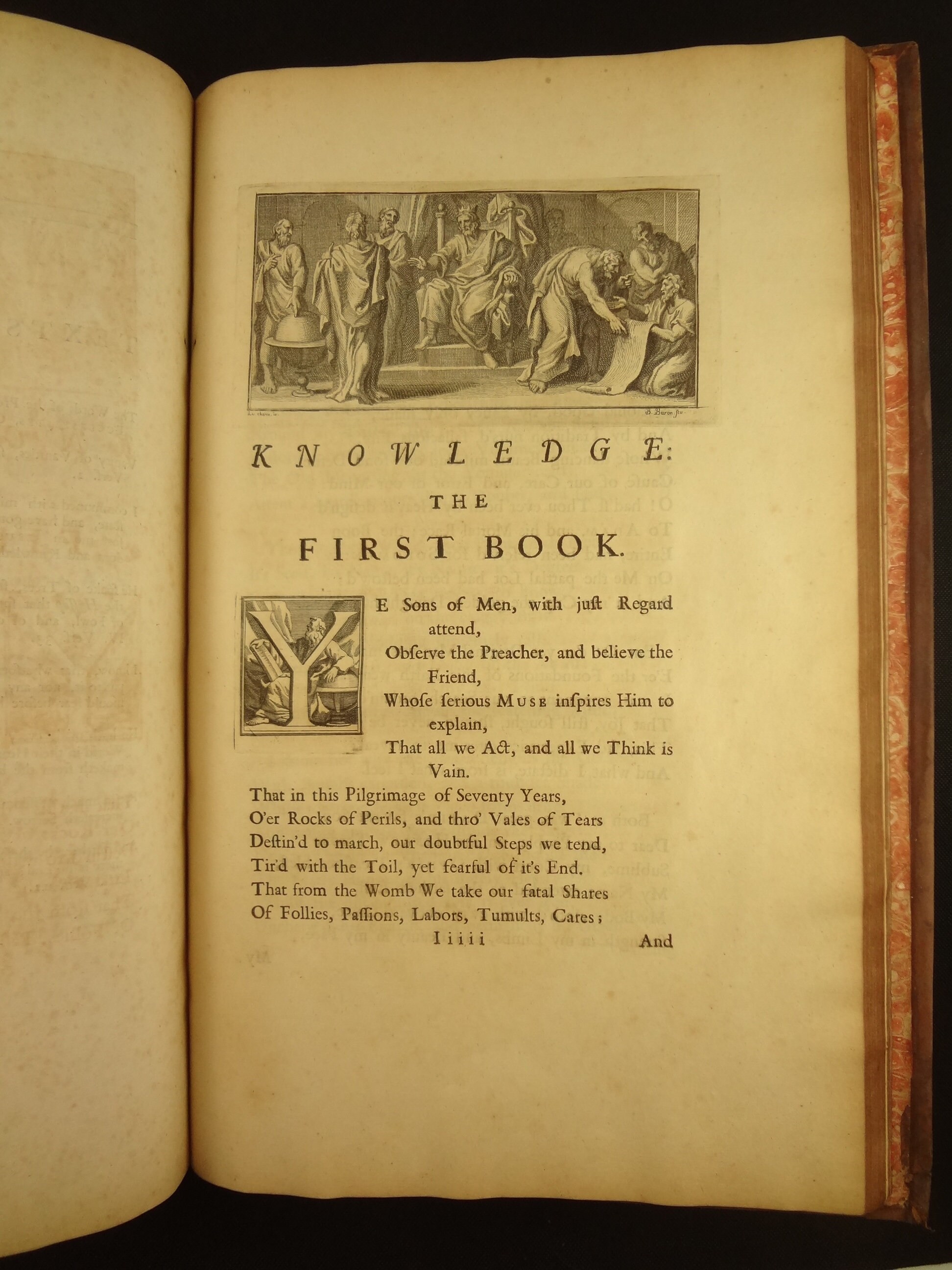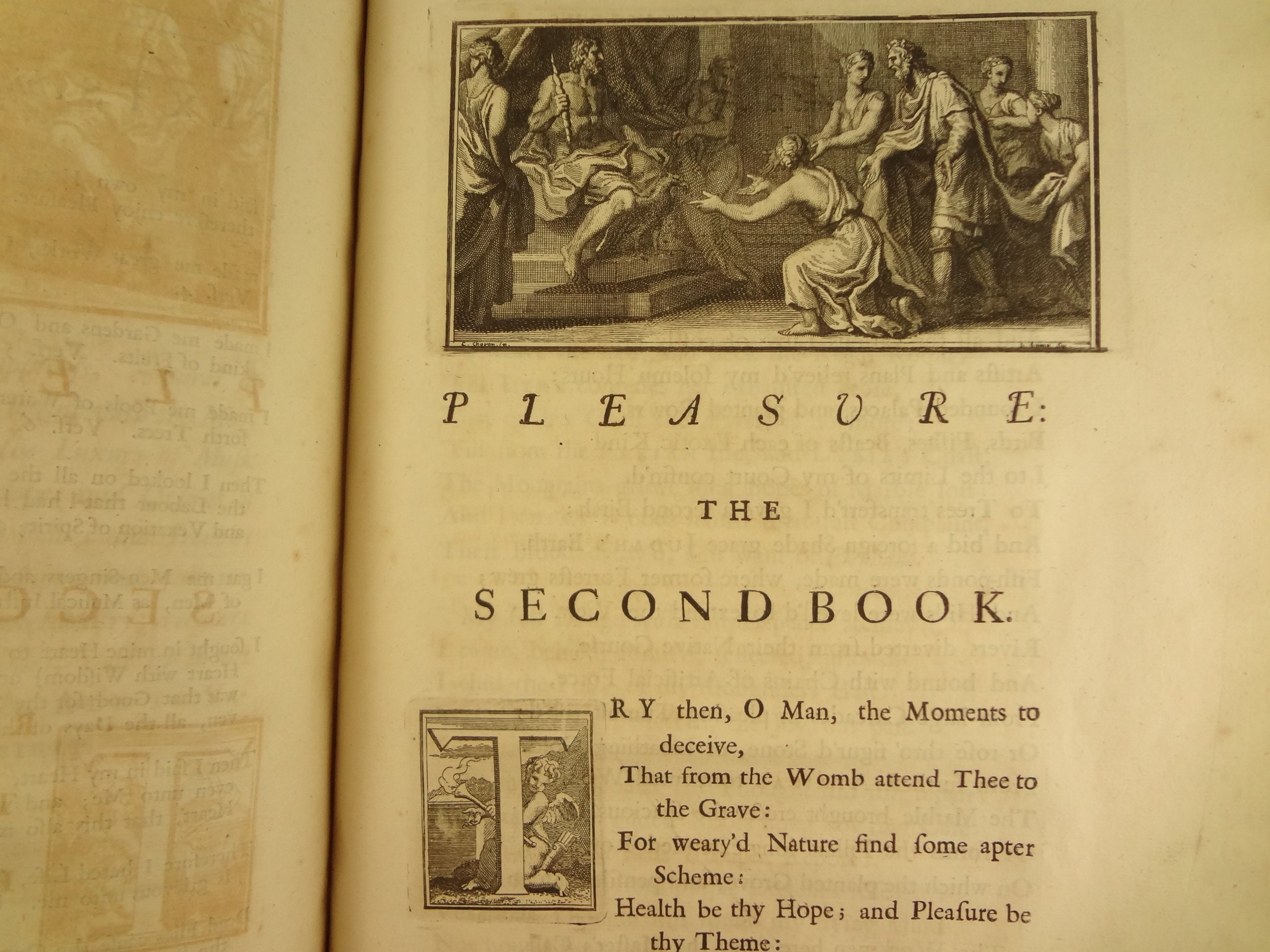Fleur-de-lis paper edition; 1718 Poems on Several Occasions by Matthew Prior
$599.99
An odd state of Matthew Prior's 1718 (Jacob Tonson printed) Poems on Several Occasions, this copy is on the Fleur-de-Lis paper, which was considered the finest paper and used for the (circa 25) presentation copies, but this copy is the subscription copy size; the subscription copies are typically found with a different watermark in the paper. This copy is really quite odd, since the Fleur-de-Lis paper is considered one of the distinguishing marks of the over-sized presentation copies.
This book was issued in three sizes; a trade size, a subscription size and a presentation size. The presentation copies were produced on Fleur-de-Lis paper and were the largest copies, with wider inner margins to accompany the larger paper size. The subscription copies, were laid out a little smaller (again, easiest measured at the margin) and the trade copies were the smallest.
This copy has the Fleur-de-Lis paper associated with the copies Prior presented to his friends, but the overall paper size and inner-margins match with the subscription copy size. Most subscription copies have a "Strasburg Bend" watermark.
In 1952, Bunker Wright did a detailed study of the different states of this printing (Ideal Copy and Authoritative Text, Modern Philology, pgs. 234-241, May, 1951), - "These are the positive marks of distinction: the small size, with pages originally measuring at least 14 X 9 inches, has inner margins averaging 1.5 inches and is printed on paper usually watermarked with the arms of the City of London; the medium size, with pages originally at least 18 X 11 inches, has inner margins averaging 1 7/8 inches and is printed on paper usually watermarked with the arms of Strasbourg; the large size, with pages originally at least 20 X 14 inches, has inner margins of over 3 inches and is printed on paper watermarked with a fleur-de-lis on a crowned shield."
About the Work -
Early in 1717 Prior's financial affairs were in such shape that his friends were much concerned for him. Pope, Arbuthnot, Gay, and Erasmus Lewis proposed to relieve his financial straits by the same expedient that had been (and was to be) so profitable to Pope-promotion of a subscription edition. This proposal was approved; but the dignity of his erstwhile position, together with his natural vanity, prompted Prior to impose two restrictions. In the first place, no formal advertising of the subscription should appear: no printed advertisement should be circulated, either in the form of handbills (such as the "Proposals" issued by Pope and commonly employed during the period by others) or as announcements in the newspapers. Instead, requests for subscriptions should be "managed by friends in such a manner as" should be "least shocking to the dignity of a plenipotentiary." In the second place, Prior insisted that the edition should be expensive enough to elevate it above the common run of such affairs, and that it should be not only the most beautiful volume ever published but also the most correct.
These restrictions Prior's friends accepted with some enthusiasm. The terms of the subscription were set fairly high: one guinea at the time of subscribing and a second guinea on delivery of the book. Immediately and zealously Prior's friends sought subscribers. Not content with the resources of England, Lewis (holding the pen for Arburthnot, Prior, Pope, and Gay) solicited Swift's aid in Ireland.
Controversy over the particular beauty which the volume should assume was settled only when Tonson (who had been chosen as publisher) convinced Prior, Lord Harley, Wanley, and Morley that the plan to print the book on vellum was, as Prior phrased it, "impracticable, improbable, impossible." Second best was, then, "paper imperial, and the largest in England," with a frontispiece "as big as has been formed since the days of Alexander the Coppersmith.” By way of additional adornment, vignettes were specially designed by Louis Cheron and engraved on copper by Baron and Beauvais; and Prior himself contrived “emblems, such as cupids, torches and harts for great letters,” which the coppersmiths duly executed.
About the Author -
1911 Encyclopedia Britannica – English poet and diplomatist, was born on the 21st of July 1664. His father moved to London, and sent him to Westminster, under Dr Busby. At his father's death he left school, and fell to the care of his uncle, a vintner in Channel Row. Here Lord Dorset found him reading Horace, and set him to translate an ode. He acquitted himself so well that the earl offered to contribute to the continuance of his education at Westminster. One of his schoolfellows and friends was Charles Montagu, afterwards earl of Halifax. It was to avoid being separated from Montagu and his brother James that Prior accepted, against his patron's wish, a scholarship recently founded at St John's College. He took his B.A. degree in 1686, and two years later became a fellow.
In collaboration with Montagu he wrote in 1687 the City Mouse and Country Mouse, in ridicule of Dryden's Hind and Panther. It was an age when satirists were in request, and sure of patronage and promotion. The joint production made the fortune of both authors. Montagu was promoted at once, and Prior three years later was gazetted secretary to the embassy at the Hague. After four years of this employment he was appointed one of the gentlemen of the king's bedchamber. Apparently, also, he acted as one of the king's secretaries, and in 1697 he was secretary to the plenipotentiaries who concluded the peace of Ryswick. The poet's knowledge of French is specially mentioned among his qualifications, and this was recognized by his being sent in the following year to Paris in attendance on the English ambassador. At this period Prior could say with good reason that “he had commonly business enough upon his hands, and was only a poet by accident.”
His occasional poems during this period include an elegy on Queen Mary in 1695; a satirical version of Boileau's Ode sur le prise de Namur (1695); some lines on William's escape from assassination in 1696; and a brief piece called The Secretary. In 1701 he sat in parliament for East Grinstead. He had certainly been in William's confidence with regard to the Partition Treaty; but when Somers, Orford and Halifax were impeached for their share in it he voted on the Tory side, and immediately on Anne's accession he definitely allied himself with Harley and St John. Perhaps in consequence of this for nine years there is no mention of his name in connexion with any public transaction. But when the Tories came into power in 1710 Prior's diplomatic abilities were again called into action, and till the death of Anne he held a prominent place in all negotiations with the French court, sometimes as secret agent, sometimes in an equivocal position as ambassador's companion, sometimes as fully accredited but very unpunctually paid ambassador. His share in negotiating the treaty of Utrecht, of which he is said to have disapproved, personally led to its popular nickname of “Matt's Peace.” When the queen died and the Whigs regained power he was impeached by Sir Robert Walpole and kept in close custody for two years (1715-1717).
In 1709 he had already published a collection of verse. During this imprisonment, maintaining his cheerful philosophy, he wrote his longest humorous poem, Alma; or, The Progress of the Mind. This, along with his most ambitious work, Solomon, and other Poems on several Occasions, was published by subscription in 1718. The sum received for this volume (4000 guineas), with a present of £4000 from Lord Harley, enabled him to live in comfort; but he did not long survive his enforced retirement from public life, although he bore his ups and downs with rare equanimity. He died at Wimpole, Cambridgeshire, a seat of the earl of Oxford, on the 18th of September 1721, and was buried in Westminster Abbey, where his monument may be seen in Poet's Corner.
Prior had very much the same easy, pleasure-loving disposition as Chaucer (with whose career his life offers a certain parallelism), combined with a similar capacity for solid work. His poems show considerable variety, a pleasant scholarship and great executive skill. The most ambitious, i.e. Solomon, and the paraphrase of the Nut-Brown Maid, are the least successful. But Alma, an admitted imitation of Butler, is a delightful piece of wayward easy humour, full of witty turns and well remembered allusions, and Prior's mastery of the octo-syllabic couplet is greater than that of Swift or Pope. His tales in rhyme, though often objectionable in their themes, are excellent specimens of narrative skill; and as an epigrammatist he is unrivalled in English.
The majority of his love songs are frigid and academic, mere wax-flowers of Parnassus; but in familiar or playful efforts, of which the type are the admirable lines To a Child of Quality, he has still no rival. “Prior's”—says Thackeray, himself no mean proficient in this kind—“seem to me amongst the easiest, the richest, the most charmingly humorous of English lyrical poems. Horace is always in his mind, and his song and his philosophy, his good sense, his happy easy turns and melody, his loves and his Epicurianism, bear a great resemblance to that most delightful and accomplished master.”
Physical Attributes -
Binding measures approx. 17 7/8 x 11 1/4 x 1 3/4 inches. Pages measure approx. 17.5 x 11 with an inner margin of approx. 1.75.
Folio sized, printed in the subscription size. Paper with the watermark of the Fleur-de-Lis, the finest paper used for this printing.
Binding was restored (old restoration) with the old leather laid over the new leather.
Frontis and title illustration. Numerous examples of head/tailpieces and decorative initials.
Pages - xxii, 1-506, (6 unnumbered pages of Contents)
Collation - frontis leaf, title leaf, A2, a-c2, d1, e-i2, B-Z2, Aa-Zz2, Aaa-Zzz2, Aaaa-Zzzz2, Aaaaa-Zzzzz2, Aaaaaa-Oooooo2
Condition -
See pictures. Older rebind that placed the 18th century binding over the new binding; still, the oldest overlaid parts of the binding, especially at the spine, are old and crazed/chipping (and the corners are rubbed through). The hinges have been replaced with cloth that is bound, a strong library repair. Verso of flyleaf and blank front endpaper have library bookplate and stamp of Greenfield Mass. Historical Society, 1910; on verso of blank endpaper is an old manuscript shelfmark.
Pages are toned and a little dusty. Some thumbing, some pages toned, occasional foxing spots, stray ink marks/drops, occasional dog-eared page, candle ember spots, etc. throughout, as typical to ex-library books.
Collates complete. A complete, but ex-library copy, with the pages weathered as expected for an institutional book; there are no annotations in the text though.
Shipping from United States
Processing time
1-3 business days
Customs and import taxes
Buyers are responsible for any customs and import taxes that may apply. I'm not responsible for delays due to customs.
Payment Options
Returns & Exchanges
I gladly accept returns
Just contact me within: 7 days of delivery
Ship items back to me within: 14 days of delivery
I don't accept exchanges or cancellations
But please contact me if you have any problems with your order.
Conditions of return
Buyers are responsible for return shipping costs. If the item is not returned in its original condition, the buyer is responsible for any loss in value.
Privacy policy
We do not collect any private information. For billing, Etsy provides the service. We only receive notice that payment was made. The shipping address is provided to us by Etsy, based on what they buyer submitted during check-out. We do not store these addresses. That is the extent of the information that we receive during a transaction.
